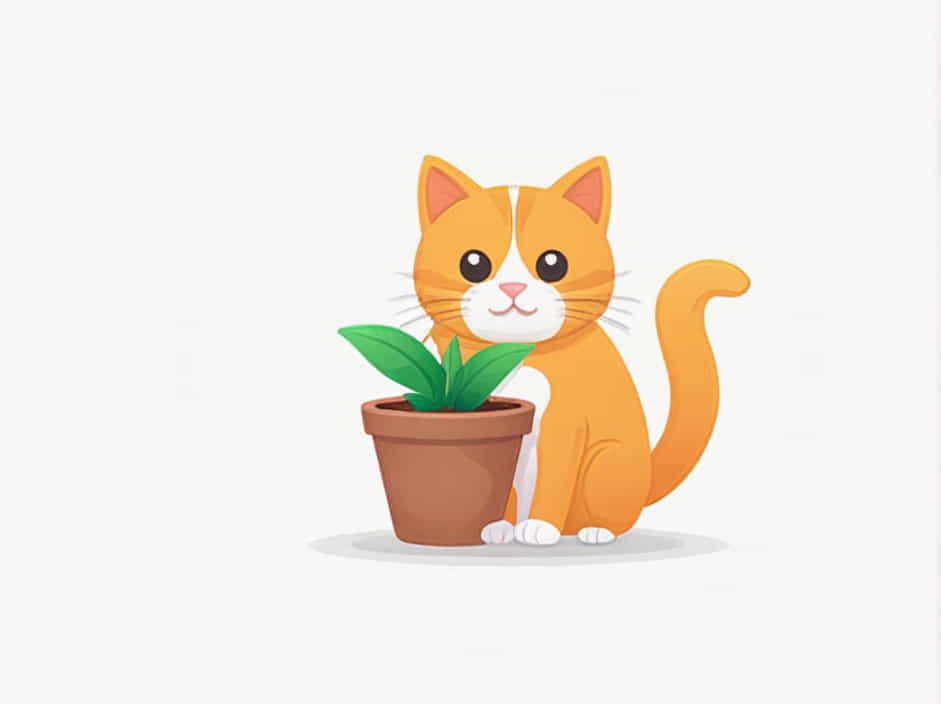If you have an office cat and love keeping plants in your workspace, you might wonder how to fertilize your plants safely. Many fertilizers contain chemicals that could be harmful to cats, so choosing the right type and applying it correctly is essential.
In this guide, we’ll explore how to fertilize plants safely in an office environment while keeping your feline friend happy and healthy.
Why Do Office Plants Need Fertilizer?
Plants in an office setting rely on nutrients in the soil to thrive. However, over time, these nutrients get depleted, leading to:
- Slow growth
- Yellowing leaves
- Weak stems
- Fewer flowers or leaves
By using the right fertilizer, you replenish essential nutrients like nitrogen (N), phosphorus (P), and potassium (K), ensuring your plants stay healthy and vibrant.
Types of Fertilizers for Office Plants
When fertilizing plants in an office where a cat is present, it’s important to choose pet-safe options. Here are some common types:
1. Organic Fertilizers (Best for Cat-Friendly Offices)
Organic fertilizers are made from natural materials and are safer for pets. Some options include:
- Compost – Decomposed plant material rich in nutrients.
- Worm castings – Nutrient-packed waste from worms, great for soil health.
- Bone meal – Provides phosphorus, but should be kept away from cats.
- Fish emulsion – A liquid fertilizer made from fish, excellent for plant growth.
2. Synthetic Fertilizers (Use with Caution)
These fertilizers work quickly but may contain chemicals that can be toxic to cats. If using, ensure your cat cannot access the treated soil.
3. Slow-Release Fertilizers
These fertilizers release nutrients over time, reducing the need for frequent application. They are a great low-maintenance option for office plants.
4. Liquid Fertilizers
Liquid fertilizers work fast and are easy to apply, making them ideal for office plants in pots. However, ensure they are pet-safe and diluted properly.
How to Fertilize Office Plants Safely
1. Choose the Right Fertilizer
Select a fertilizer that suits your plant’s needs and is safe for cats. Organic and slow-release fertilizers are the best options for an office setting.
2. Apply the Fertilizer Correctly
- For liquid fertilizers: Mix with water and apply to the soil, avoiding leaves.
- For slow-release fertilizers: Sprinkle evenly over the soil surface.
- For compost or worm castings: Mix into the top layer of soil.
3. Keep Your Cat Away from Fertilized Soil
Some cats love to dig in plant pots, which can expose them to fertilizer ptopics. To prevent this:
- Cover the soil with decorative stones or mesh.
- Use hanging planters or place pots on shelves.
- Distract your cat with cat grass or toys.
4. Water After Fertilizing
Always water your plants after applying fertilizer to help distribute nutrients evenly and prevent your cat from sniffing or licking the soil.
5. Avoid Over-Fertilizing
Too much fertilizer can burn plant roots and lead to excessive growth, making plants more vulnerable to pests. Follow the recommended dosage on the fertilizer package.
Best Fertilization Schedule for Office Plants
1. Spring and Summer (Active Growth Period)
- Fertilize every 2-4 weeks for leafy plants.
- Flowering plants may need a phosphorus-rich fertilizer every 3 weeks.
2. Fall and Winter (Dormant Period)
- Reduce fertilization to once every 6-8 weeks or stop completely.
- Over-fertilizing during winter can stress plants.
3. Newly Potted Plants
- Wait 4-6 weeks before fertilizing, as fresh potting soil contains nutrients.
4. Signs Your Plant Needs Fertilizer
- Pale or yellow leaves
- Slow growth
- Weak stems
- No flowers or new leaves
If your plant looks unhealthy despite proper watering, it may need fertilizer.
Cat-Safe Plants That Thrive with Fertilization
If you’re looking for pet-friendly office plants, consider these options:
1. Spider Plant (Chlorophytum comosum)
- Non-toxic to cats
- Thrives with liquid or slow-release fertilizer
- Improves air quality in offices
2. Areca Palm (Dypsis lutescens)
- Safe for cats
- Loves monthly feeding with organic fertilizer
- Adds a tropical touch to office spaces
3. Boston Fern (Nephrolepis exaltata)
- Cat-friendly and easy to care for
- Requires fertilization every 4-6 weeks
- Prefers humid environments
4. Calathea (Calathea spp.)
- Safe for pets
- Benefits from a diluted organic fertilizer
- Prefers indirect light and moist soil
Fertilizers to Avoid in a Cat-Friendly Office
Some fertilizers contain harmful chemicals that can be dangerous if ingested by cats. Avoid:
- Fertilizers with high ammonia content
- Synthetic pesticides and herbicides
- Bone meal and blood meal (strong smell can attract cats)
- Cocoa mulch (contains theobromine, which is toxic to cats)
If you suspect your cat has ingested fertilizer, look for signs like vomiting, drooling, or lethargy, and contact a vet immediately.
Frequently Asked Questions (FAQ)
1. Can I Use Coffee Grounds as Fertilizer in an Office with a Cat?
Yes, coffee grounds provide nitrogen, but they can be acidic. Use sparingly and mix with soil.
2. Is Fish Emulsion Safe for Cats?
Yes, but the strong smell might attract your cat. Keep it well-mixed in the soil.
3. How Do I Stop My Cat from Digging in Fertilized Soil?
- Place decorative rocks over the soil.
- Use pet-safe deterrents like citrus peels.
- Grow cat grass as a distraction.
4. Can I Use Indoor Plant Fertilizer on Outdoor Plants?
Yes, but outdoor plants may need stronger formulations for larger root systems.
5. What If I Over-Fertilize My Office Plant?
- Flush the soil with clean water to remove excess nutrients.
- Remove damaged leaves and allow the plant to recover.
Fertilizing office plants helps them stay healthy and vibrant, but it’s essential to choose safe fertilizers if you have an office cat. Organic options like worm castings, compost, and fish emulsion provide essential nutrients without posing risks to pets.
By following proper fertilization techniques, keeping your cat away from treated soil, and using pet-friendly plants, you can create a lush, green office environment that both you and your furry friend can enjoy!
